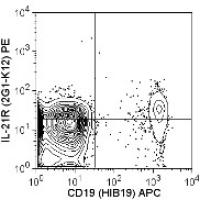-
Sign In
-

-
 Sony Biotechnology
Sony Biotechnology
-

-
 Sony Biotechnology
Sony Biotechnology
Purified anti-human CD360 (IL-21R)
Antibodies Single
Sony
2G1-K12
Flow Cytometry
Mouse IgG1, κ
Human
IL-21R transfected Ba/F3 cells
100 µg
2339010
$273.00
Description
The human interleukin 21 receptor (IL-21R), is a single pass type I membrane protein and a member of the type I cytokine receptor family. Of the type I cytokine receptors, IL-21R exhibits the greatest extracellular homology to the IL-2R β subunit, i.e., contains one copy of the WSXWS-containing cytokine-binding domain. Intracellular domains of IL-21R include the Box 1 and Box 2 elements which are similar to the IL-9R intracellular region. Upon binding IL-21, the IL-21R forms a heterodimer with the common gamma subunit (CD132) and induces Jak/Stat signaling. IL-21R is expressed on B cells and at various levels on NK and T cells. IL-21 is a potent immunomodulatory cytokine mainly produced by NKT and CD4 T-cells (particularly the inflammatory Th17 subset) and has pleiotropic effects on both innate and adaptive immune responses. These actions include positive effects such as enhanced proliferation of natural killer (NK) cells and cytotoxic T cells that can destroy virally infected or cancerous cells and direct inhibitory effects on the antigen-presenting function of dendritic cells. It can also be proapoptotic for B cells and NK cells. Recent studies have shown that IL-21 is also an autocrine cytokine that potently induces Th17 differentiation and suppresses Foxp3 expression, and serves as a target for treating inflammatory diseases.
Formulation
Phosphate-buffered solution, pH 7.2, containing 0.09% sodium azide.Recommended Usage
Each lot of this antibody is quality control tested by immunofluorescent staining with flow cytometric analysis. For flow cytometric staining, the suggested use of this reagent is ≤ 2.0 microg per 106 cells in 100 microL volume. It is recommended that the reagent be titrated for optimal performance for each application.
References
1. Rodrigues-Bayona B, et al. 2012. J. Immunol. 188:1578. PubMed


